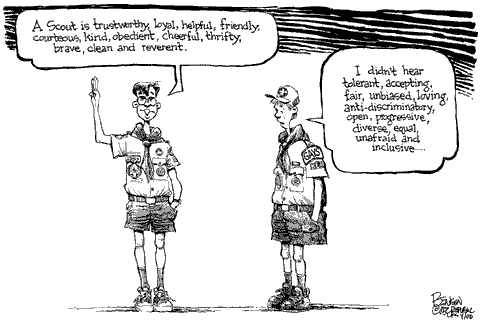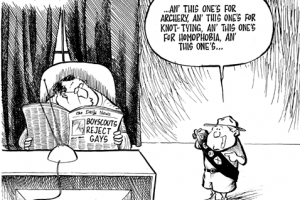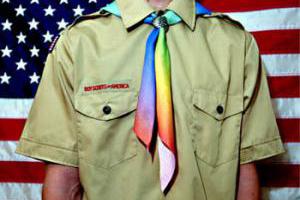Serendip is an independent site partnering with faculty at multiple colleges and universities around the world. Happy exploring!
"A Scout Is...": Building a Right Relationship Between the Boy Scouts of America and the LGBTQ Community

" A Scout Is...": Building a Right Relationship Between the Boy Scouts of American and the LGBTQ Community
"A Scout is: Trustworthy, Loyal, Helpful, Friendly, Courteous, Kind, Obedient, Cheerful, Thrifty, Brave, Clean, Reverent" - The Boy Scout Law

Part I: The Issue at Hand
The Boy Scouts of America’s website is covered in testaments to the organization’s commitment to the betterment of America’s male youth. Its mission statement professes dedication to building active and conscientious citizens, its parent portal promises that it is the best organization to reinforce ethical standards and promote self-confidence, and its timeline gleams with the success of past service projects and awards from numerous presidents. What the website neglects to publicize, however, is perhaps the most telling statement of all about BSA’s moral and ethical belief system: the Boy Scouts do not allow openly gay members to join their ranks.
More than one in every ten young males in America is a Boy Scout. Consequently, one in every ten boys in America is being instructed on the importance of morality and character by a homophobic organization. BSA justifies this decision, which is not explicitly printed in any of their literature, by asserting that homosexuality is not in line with the Scout Oath, in which Scouts swear to be morally straight, and the Scout Law, which states that Scouts must be clean in word and deed. While the Scouts now allow youth from many religious affiliations to join their organization (though atheists and agnostics are not allowed in), they must swear their allegiance to serve not only their country but God as well, and it is this fundamentally religious undertone that dictates the organization’s definition of morality. Thus, if a man is closeted to his troop, he may remain a member of the Scouts. However, if a younger Scout or an older Scoutmaster is an “avowed homosexual”, a phrase that is meant to refer to someone who is openly gay, he can be dismissed from the organization purely on the basis of his sexual orientation. This policy is shocking in light of the fact that Scoutmasters are instructed to counsel Scouts if they’ve committed unethical acts, including ones that involve violent or illegal activity, yet leaders must immediately dismiss those who come out as gay.
Perhaps you’re wondering about the legality of this discriminatory policy. So was James Dale, an Assistant Scoutmaster of a New Jersey Boy Scout troop who was dismissed from the Scouts when they discovered he was openly gay and participating in gay rights activism. An Eagle Scout himself, which is the highest rank that a Boy Scout can rise to and one that is only achieved by a mere five percent of all Scouts, Dale had been an active and eager leader until the organization discovered that he had attended a conference on health issues in the teenage LGBTQ community. Subsequently, he was quoted in an article about the conference as saying that he was gay. This resulted in his immediate termination. Dale brought the case to court, and the New Jersey Supreme Court ruled that the Boy Scouts must reinstate Dale because excluding him on the basis of his sexuality was violating public accommodation laws. However, the Boy Scouts appealed this decision to the Supreme Court of the United States, which overturned the verdict. As Chief Justice William Rehnquist wrote in the statement of majority opinion, “It is certainly possible for an individual to become so identified with a position as to epitomize it publicly. When that position is at odds with a group's advocated position, applying an antidiscrimination statute to require the group's acceptance of the individual in a position of group leadership could so modify or muddle or frustrate the group's advocacy as to violate the expressive associational right.”

Part II: Forming a Right Relationship
Regardless of the Supreme Court’s decision, there is significant injustice in BSA’s decision to discriminate against the LGBTQ community. While the US Supreme Court ruled that as a private organization, the Boy Scouts have the right to reject anyone that they feel interferes with their code of conduct or their moral standards, alternative sexualities are not moral codes individuals live by: at their core, they’re simply sexual preferences. If the organization is truly concerned about issues of morality and lifestyle rather than sexuality, there are ways in which the two parties, meaning BSA and the LGBTQ community, can form an alliance, one that is based upon mutual tolerance and respect instead of mandated laws and regulations. John Humbach, a professor of law at Pace University and the author of “Towards a Natural Justice of Right Relationships” (2001) tells us that while most people associate justice with the concept of legal rights, another type of justice can be found in the formation of right relationships. He explains, “At its core, the justice of right relationships is the intrinsic good that inures to persons who live in interaction with others whose fundamental moral concern is to maintain the quality and mutual worth of their relationships, instead of insisting on their rights” (1). Humbach also outlines the necessary characteristics of such a relationship, including that they must be free of “negative markers” like systematic oppression, exploitation, or manipulation (Humbach, 2). Currently, BSA is both manipulating gay men by forcing them to hide a part of their identities and oppressing their freedom to participate in the Boy Scouts as their true selves.
The following three suggestions to the Boy Scouts, if adhered to, should help to foster an alliance between their organization and the LGBTQ community:
* The organization should acknowledge the statement issued by the American Psychological Association which asserts that, “[There is a] lack of scientific foundation to support the Boy Scouts' position that openly gay people are unsuited to participate in scouting -- a position based on stereotypical assumptions regarding the mental health, morality and character of gays, lesbians and bisexuals.” The idea that sexual preference does not define identity, morality, or strength of character would be better enunciated through workshops with a licensed psychologist, which both troop leaders and leaders of the organization should attend.
*The organization should continue their policy of discussing personal issues of sex and sexuality sparingly and referring youth to appropriate channels if they have questions. There should be no judgment involved in these conversations, as before. This should remain consistent across people of all sexualities.
*The organization should include merit badges in a) diversity studies, which would include learning about people of various races, ethnicities, dis/abilities, and sexualities, and b) mediation training, which would promote tolerance and compromise while simultaneously fostering leadership skills.
While the party that seems to be most contentious in this relationship is the Boy Scouts, building an alliance is dependent on the efforts of both parties in question. Thus, it’s necessary to outline ways in which the LGBTQ community might take with the goal of creating an alliance. For example, members of the Boy Scout community should be treated with respect, and assumptions about tolerance should not be made on the basis of religious beliefs. In order to build a right relationship, there must be mutual commitments made by both parties to one another, and respect is a commitment that will certainly be at the foundation of this right relationship should it ever come into being.

This Boy Scout is...
Humbach, John. Towards a Natural Justice of Right Relationships. From Human Rights in Philosophy and Practice, Burton M. Leiser and Tom D. Campbell, eds., 2001. 1-18.
http://scholar.google.com/scholar_case?case=6404209718401303437&hl=en&as_sdt=2&as_vis=1&oi=scholarr
http://www.bilerico.com/2009/01/gay_boyscouts.gif
http://drnealwinslow.files.wordpress.com/2007/10/042800benson322.gif
http://www.bsa-discrimination.org/assets/images/Rainbow_Neckerchief.jpg


